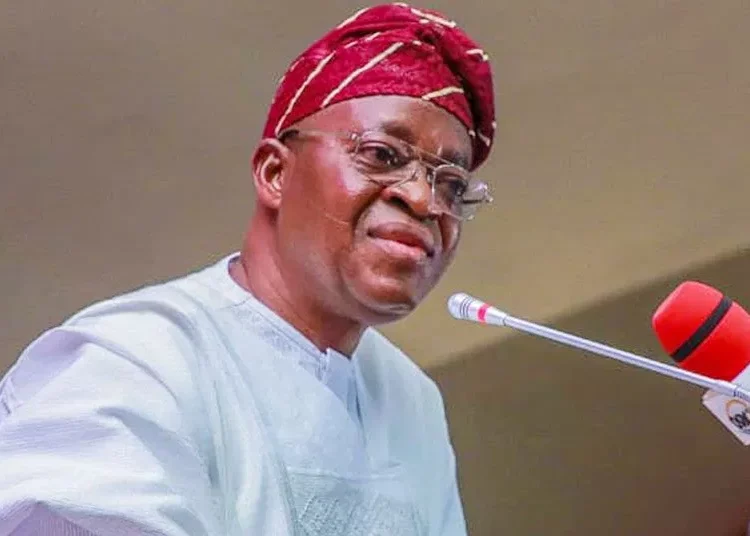The minister of Marine and Blue Economy, Adegboyega Oyetola, on Wednesday, said revenue from the nation’s blue economy has risen by 90 per cent.
Speaking at the 2025 day of the Seafarers’ celebration, held in Port Harcourt, Rivers State, titled, “My Harassment-Free Ship,” the minister, said with automation, modernisation of the nation’s ports and the deployment of technology, the blue economy will surpass the Nigerian National Petroleum Company Limited (NNPC) revenue concerning it.
This comes as the Nigerian Ports Authority (NPA) is projecting a massive revenue leap to over N1.27 trillion in 2025, representing a 40 per cent increase from the N894.86 billion it realised in 2024.
Oyetola further stated that the Ministry is doing its best to unlock the potential for the growth of the Nigerian economy through job creation and environmental sustainability.
He said, “I want to assure you, even right now, within a little time, we’ve increased our revenue by not less than 90 per cent. We’re just not making noise about it, but with automation, with the modernisation of the port, with the development of technology, we believe that the Blue Economy will surpass the NNPC revenue.
“We’re doing our best to ensure that we’re able to unlock the potential of the options for the growth of the Nigerian economy, job creation and environmental sustainability. In the past, there was no operating policy. We succeeded in putting a policy in place that is very robust and has met the world’s best standards. It is a policy that defines in clear terms the operation of the blue economy in Nigeria.”
Moreover, in a major milestone in Nigeria’s journey towards a smarter, more transparent, and efficient maritime sector, the federal government has launched a Maritime Labour E-Platform to digitalise the governance of maritime labour.
Oyetola said the platform is more than just a portal, but offers real-time data access, enhances regulatory compliance, and creates a centralised system for labour administration.
His words: “This E-Platform is a bold step toward digital governance, improved service delivery, and industry-wide innovation. The platform offers real-time data access, enhances regulatory compliance, and creates a centralised system for labour administration.
“I commend NIMASA for this forward-looking initiative, which aligns perfectly with our Ministry’s vision of ease of doing business, global competitiveness, and human capital development in the blue economy.”
While encouraging maritime stakeholders to embrace the new platform and make full use of its capabilities, he remarked that this year’s theme, “My Harassment-Free Ship,” speaks to the collective duty to make every ship a safe, respectful workplace.
“Harassment and bullying have no place in our maritime industry. We are prioritising quality training by upgrading maritime institutions, expanding capacity-building programmes, and aligning our seafarer education with international standards.”
“We are committed to full compliance with the STCW Convention, including recent amendments mandating anti-harassment training onboard ships. These steps are vital to ensure our seafarers remain competitive and globally employable,” he said.
Additionally, he assured that the government is investing in seafarers’ welfare through stronger regulation of recruitment and placement agencies, improving access to decent work, and collaborating with shipowners to guarantee fair treatment and onboard safety.
“The recent Collective Bargaining Agreement, facilitated by NIMASA alongside industry unions and employers, sets a new benchmark for fair wages, decent working conditions, and improved dispute resolution. NIMASA continues to enforce flag and port state controls, and promote Nigeria’s presence in global shipping, ensuring our seafarers are well-protected and respected internationally,” he stated.
Consequently, the director general of the Nigerian Maritime Administration and Safety Agency (NIMASA), Dr Dayo Mobereola, has called on Shipowners, operators and crewing agencies to review their operational manuals to align with the amendments to the MLC 2006 code.
The MLC 2006 codes, it was gathered, addressed issues affecting Seafarers such as recognition of seafarers as key workers, improved protection against shipboard violence and harassment, enhanced access to shore leave, repatriation, and updated medical and occupational safety standards.
“At the recently concluded 113th session of the International Labour Conference held in Geneva, seven amendments to the MLC 2006 code addressing a broad range of issues affecting Seafarers, including the recognition of seafarers as key workers, improved protection against ship board violence and harassment, enhanced access to shore leave and repatriation and updated medical and occupational safety standards were approved by an overwhelming majority.
“These seven amendments reflect a collective global effort to align maritime Labour standards with the evolving landscape of global shipping. I, therefore, call on Shipowners, operators and crewing agencies to begin to review their operational manuals to align with these amendments ahead of the expected entry into force in December 2027.
“Our Seafarers must be able to report grievances without fear of retaliation, while also ensuring protection against vexations or malicious complaints.”
The NIMASA boss also urged government, employers, unions, shipowners, and civil society- that Seafarers should not be left alone in their struggles.
Meanwhile, the Nigerian Ports Authority (NPA) is projecting a massive revenue leap to over N1.27 trillion in 2025, representing a 40 per cent increase from the N894.86 billion it realised in 2024.
This ambitious target, the Authority says, is anchored on sweeping modernisation efforts, the full activation of the Dangote Refinery’s marine operations, and the deployment of cutting-edge technology to enhance port efficiency.
Managing director of the NPA, Abubakar Dantsoho, disclosed this in a presentation during a budget defence session with the House of Representatives Committee on Ports and Harbours, where he defended the agency’s 2025 budget estimates and provided insights into its 2024 performance.
“Our 2025 budget proposal is more than figures, it reflects our aspirations for a more efficient, globally competitive port system,” Dantsoho told lawmakers, adding that over 70 per cent of the proposed expenditure will go into capital projects.
For 2024, the Authority surpassed its revenue target of N865.39 billion, posting an actual realisation of N894.86 billion.
However, Dantsoho revealed that only N417.86 billion, less than half of the approved N850.92 billion expenditure, had been spent as of the time of reporting.





